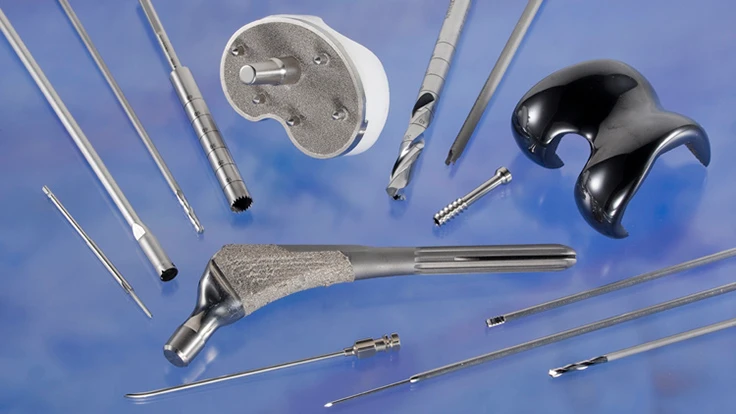
Transparency Market Research
Transparency Market Research (TMR) estimates that the global implantable medical devices market expand at a 4.9% compound annual growth rate (CAGR) between 2016 and 2024. At this pace, the market, which had a valuation of $32.3 billion in 2015, is expected to rise to $49.8 billion by 2024.
Of the key materials used for manufacturing medical implants, titanium is presently the most preferred but is expected to lose its prominence to other options such as titanium alloys and zirconium. Between 2016 and 2024, the market for titanium implants is expected to expand at a 4.7% CAGR. The markets for titanium alloy implants and zirconium implants are expected to expand at 5.5% and 6.4% CAGR over the same period, respectively.
The global implantable medical devices market features a largely consolidated competitive landscape, with the top five companies accounting for a share of more than 50% in 2015, TMR reports in, “Implantable Medical Devices Market - Global Industry Analysis, Size, Share, Growth, Trends, and Forecast, 2016 - 2024.” These companies, including Zimmer Biomet, Johnson & Johnson, Stryker Corp., Medtronic plc, Institut Straumann AG, hold sway owing to innovation, rapid introduction of newer and more effective product varieties, and presence across several key regional markets. Being a technology and research intensive field, governed by stringent approval regulations, the implantable medical devices market faces a low threat of new entrants in the next few years. However, the introduction of more promising substitutes to traditionally used materials is expected to intensify competition.
Rising demand globally
A plethora of factors are boosting the global consumption of medical implantable devices. Some of the chief ones of these are the rising numbers of people suffering from chronic degenerative diseases such as arthritis and cardiovascular issues and the high prevalence of dental problems, which could require orthodontic and periodontics interventions. While busy lifestyles, unhealthy dietary habits, lack of physical activities, and rising geriatric population are triggering chronic health diseases, the rising intake of junk/fast food is leading to the increased incidences of dental issues. Over the next few years, these factors are expected to arise as high-impact drivers of the global implantable medical devices.
Along with these factors, the rising prevalence of a number of congenital diseases and the increased awareness and consciousness regarding body’s appearance, and the alleged boost to self-esteem that cosmetic surgeries bring, have also been underlined as the key drivers of the global implantable medical devices market. The increased awareness regarding body aesthetics has given a huge boost to the market for dental surgeries involving implantations, thus driving the global implantable medical devices market.
Future demand for conventional implants
Studies have demonstrated that implants made from materials such as nickel and chromium are prone to corrosion and can trigger cancers. Implants made from cobalt alloy are known to pose risks to human health owing to in vivo ion release; polyethylene implants could be a potential trigger for bone lysis and localized tissue ruptures. Owing to the potential health issues that many varieties of implants cause, patients are more prone to opt for other alternatives. Along with this, the vast developments in the surgical field could also stimulate the consumer to prefer surgeries that promise minimal risk to health.
Moreover, the high costs of medical implants and the concerns regarding post-implantation infections, which may add to the overall cost of implanting a medical device in the body, are also restraining the overall growth prospects of the global implantable medical devices market to a certain extent.
Source: Transparency Market Research
Latest from Today's Medical Developments
- IMTS 2026 runs Sept. 14-19 at McCormick Place in Chicago, Illinois
- Master Bond’s MasterSil 800Med
- ZEISS celebrates 100 years of advancing innovation in the US
- Teleflex sells acute care and urology businesses for $2.03 billion
- HANNOVER MESSE: Where research and manufacturing meet
- What’s next for the design and manufacturing industry in 2026?
- Arcline to sell Medical Manufacturing Technologies to Perimeter Solutions
- Decline in German machine tool orders bottoming out





